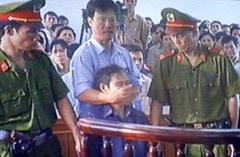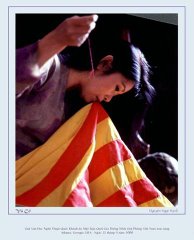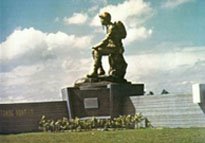
Sat Jun 16
Authorities on Saturday released a lawyer who was on a U.S. list of activists detained this year by Vietnam, two days before President Nguyen Minh Triet goes to the United States on a state visit.
The Vietnam News Agency reported that Le Quoc Quan, 36, who was detained in March after returning to Vietnam from a five-month fellowship in the United States, was released to his family in Hanoi.
He "made sincere declaration of guilt during his temporary detention for investigation" the official news agency said.
It said Quan had been held in "temporary custody for violating Vietnamese law" but provided no further details.
Last weekend, Triet granted amnesty to Nguyen Vu Binh, a 39-year-old former Communist Party magazine journalist who was sentenced to seven years imprisonment and three years probation in May 2004 on charges of spying.
In May, a former policeman in the pre-1975 U.S.-backed South Vietnam was released and left for the United States after serving 22 years of a life sentence. Phan Van Ban 70, had been found guilty of treason in 1985.
The United States has for months called for the release of several activists and people put on trial and jailed for "spreading propaganda against the state." They have included lawyers, a priest and small businessmen.
Communist Party-ruled Vietnam does not tolerate political opposition outside of its supervision. It said the seven people jailed since March for between three to eight years broke the law.
Western human rights groups have decried the arrests and trials as "a crackdown on dissent," a charge Hanoi rejects.
Triet will be the first post-war communist Vietnam head of state to visit the United States since the end of the war in 1975. He is scheduled to start his visit in New York on Monday and he will meet President George W. Bush in the White House on June 22. He will also go to Los Angeles.






1 comment:
It's good news. It proves that as Vietnam increases its economic integration with the world, the country will increasingly have to face and accept the rules of the game regarding law and human rights.
Post a Comment